Hundreds of new Arizona laws kicked in Wednesday
- Updated
Here's what you need to know so you're not caught breaking a new law.
- By Howard Fischer Capitol Media Services
- Updated
Got one of those plastic covers on your license plate to thwart photo radar?
Get out your screwdriver. As of Wednesday, Aug. 9, they’re going to be illegal.
 The measure on license plate covers culminates years of efforts by Sen. Steve Farley, D-Tucson.
Farley did not present it as a method of helping police catch more speeding motorists with photo radar, a technology that has proven unpopular with many lawmakers. Instead, he sold it as a law-and-order measure, saying that bad guys get away because police and witnesses to crimes can’t read the license plates of all vehicles.
- By Howard Fischer Capitol Media Services
- Updated
Legislators also voted to curb the ability of police and prosecutors to seize property, requiring they prove by “clear and convincing evidence” that the items they want to confiscate were involved in criminal activity.
That’s not as stringent as required to gain a criminal conviction where a judge or jury must find someone is guilty “beyond a reasonable doubt.”
But it is more than required now, when a prosecutor can prove by a “preponderance of evidence” there’s a link between the property and a crime. That is basically a balancing test, meaning all a judge need find is that the evidence show it’s more likely than not there is a link.
The change is important because police and prosecutors can seize property without ever charging the owner with a crime, much less getting a conviction.
- By Howard Fischer Capitol Media Services
- Updated
- Requiring police to get warrants when tracking the location of cellphones.
- Expanding the definition of “terrorism” to include acts intended to coerce civilians and “further the goals, desires, aims, public pronouncements, manifestos or political objectives of any terrorist organization.”
- Allowing for an enhanced sentence if the defendant acted because the victim was a peace officer, whether or not that officer was on duty.
- Requiring the Department of Corrections to provide notice to area residents when locating a correctional facility nearby.
- Allowing community notification of registered sex offenders to be done electronically.
- By Howard Fischer Capitol Media Services
- Updated
The law with the broadest implications for guns doesn’t even mention firearms. Instead, it bars state and local governments from mandating that anyone who sells any property must get a background check on the buyer.
The effect, though, would be to preclude ĂŰĚŇÓ°ĎńAV or local governments from closing what’s been called the “gun-show loophole” in federal law, which says background checks are not required for sales by individuals, including at gun shows, no matter how many weapons they sell.
Rep. Randall Friese, D-Tucson, derided contentions the measure is not about guns.
“No one is talking about background checks for refrigerator sales or microwave sales or dining room furniture sales,” he said during floor debate. “Let’s just be serious.”
- By Howard Fischer Capitol Media Services
- Updated
- Prohibiting local governments from telling employees or independent contractors they cannot have a weapon that is on their own property or in their own vehicle.
- Barring any laws saying the only guns that can be sold are those that are “smart” and can fire only if held by an authorized person.
- Carving out an an exception from laws that require $600,000 in reserves for insurers who offer prepaid legal services: It is now $50,000 — but only for those who specialize in lawful use of firearms.
- By Howard Fischer Capitol Media Services
- Updated
Started in 2011, what are formally known as “education scholarship accounts” were designed for students with special needs. But proponents have incrementally expanded it to where it now also includes foster children, reservation residents and children attending schools rated D and F.
The new law removes all those conditions. But backers had to agree on a cap of enrollment of 30,000 by 2023.
Whether it becomes law, however, is another question. Foes of giving out more vouchers of tax dollars to let children go to private and parochial schools filed petitions Tuesday with more than 111,000 signatures to force the issue to a public vote.
If they have at least 75,321 valid signatures on referendum petitions, the law would remain on “hold” until November 2018, when voters would get the last word on whether to ratify or veto the change.
- By Howard Fischer Capitol Media Services
- Updated
Other education bills include:
- Easing requirements for people from other states to be able to teach in Arizona and allowing local school districts to decide whom to certify as teachers through a “classroom-based preparation program.”
- Imposing new requirements on school districts to make new high school textbooks available for public review for at least 60 days.
- Allowing children at public schools and children’s camps to use sunscreen with a note or prescription from a doctor.
- Requiring schools to report on suspensions and expulsions involving illegal substances.
- By Howard Fischer Capitol Media Services
- Updated
Arizona now will have what may be the most comprehensive requirements in the country on what doctors have to do if a baby is born alive during an abortion.
Until now the law has said if there is a live birth, it is the duty of doctors in attendance to see that “all available means and medical skills are used to preserve and maintain the life of such fetus or embryo.”
The new law provides the first-ever definition in ĂŰĚŇÓ°ĎńAV of “delivered alive.” That covers any fetus or embryo, no matter how premature, who shows breathing, a heartbeat, umbilical cord pulsation or “definite movement of voluntary muscles.”
At that point, medical professionals must do everything possible to keep the baby alive. A separate provision says any clinic that does abortions on women beyond the 20th week of pregnancy must have someone available with neonatal skills to care for the child if born alive.
- By Howard Fischer Capitol Media Services
- Updated
Lawmakers moved on two fronts to impose new hurdles on the ability of individuals to propose and enact their own laws through initiatives.
Until now judges have said that initiatives can be on the ballot if they are in “substantial compliance” with election laws. HB 2244 says there has to be “strict compliance,” disqualifying petition drives for what could be minor violations.
A judge Tuesday afternoon threw out a challenge to the statute.
Another new restriction eliminates the ability of groups hoping to put measures on the ballot to pay circulators based on the number of signatures they gather.
But this measure is subject to a referendum campaign, with opponents hoping to get enough signatures by the end of the day Tuesday to give voters the last word.
- By Howard Fischer Capitol Media Services
- Updated
Other ways election laws are being changed:Â
- Stipulating that envelopes used for early ballots have to be designed so no one can see through them.
- Making it illegal to vote in more than one state in elections featuring federal offices that are held on the same day.
- Allowing voters to opt to get the legally required publicity pamphlet about issues on the election ballot by email rather than snail mail.
- Imposing new requirements for meetings and voting by homeowners’ associations.
- By Howard Fischer Capitol Media Services
- Updated
Other ways election laws are being changed:
- Stipulating that envelopes used for early ballots have to be designed so no one can see through them.
- Making it illegal to vote in more than one state in elections featuring federal offices that are held on the same day.
- Allowing voters to opt to get the legally required publicity pamphlet about issues on the election ballot by email rather than snail mail.
- Imposing new requirements for meetings and voting by homeowners’ associations.
Odds and ends
- Exempting those who break into a locked vehicle to rescue a child or pet in imminent danger from civil liability.
- Putting new limits on who can file lawsuits over issues of disability access.
- Barring people from calling themselves “art therapists” unless they are registered with the Art Therapy Credentials Board.
- Repealing limits on how much landlords can pay in “finder fees” to those who locate prospective tenants.
- Enacting new regulations on intrastate movers, including prohibition against refusing to deliver goods, while asking for a higher fee, if the customer pays the price agreed upon before the move.
- Imposing new limits on the ability of counties to regulate home-based businesses regarding things like traffic, parking and delivery.
- Increasing the number of licenses to sell beer and wine.
- Updated
Play like a pirate or even a mermaid, just not at the same time or place.
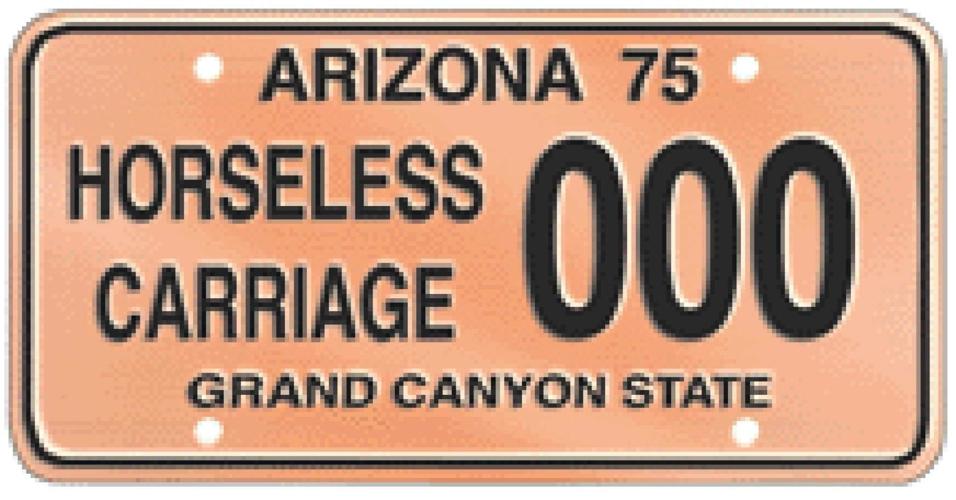
- By Howard Fischer Capitol Media Services
Got one of those plastic covers on your license plate to thwart photo radar?
Get out your screwdriver. As of Wednesday, Aug. 9, they’re going to be illegal.
 The measure on license plate covers culminates years of efforts by Sen. Steve Farley, D-Tucson.
Farley did not present it as a method of helping police catch more speeding motorists with photo radar, a technology that has proven unpopular with many lawmakers. Instead, he sold it as a law-and-order measure, saying that bad guys get away because police and witnesses to crimes can’t read the license plates of all vehicles.
- By Howard Fischer Capitol Media Services
Legislators also voted to curb the ability of police and prosecutors to seize property, requiring they prove by “clear and convincing evidence” that the items they want to confiscate were involved in criminal activity.
That’s not as stringent as required to gain a criminal conviction where a judge or jury must find someone is guilty “beyond a reasonable doubt.”
But it is more than required now, when a prosecutor can prove by a “preponderance of evidence” there’s a link between the property and a crime. That is basically a balancing test, meaning all a judge need find is that the evidence show it’s more likely than not there is a link.
The change is important because police and prosecutors can seize property without ever charging the owner with a crime, much less getting a conviction.
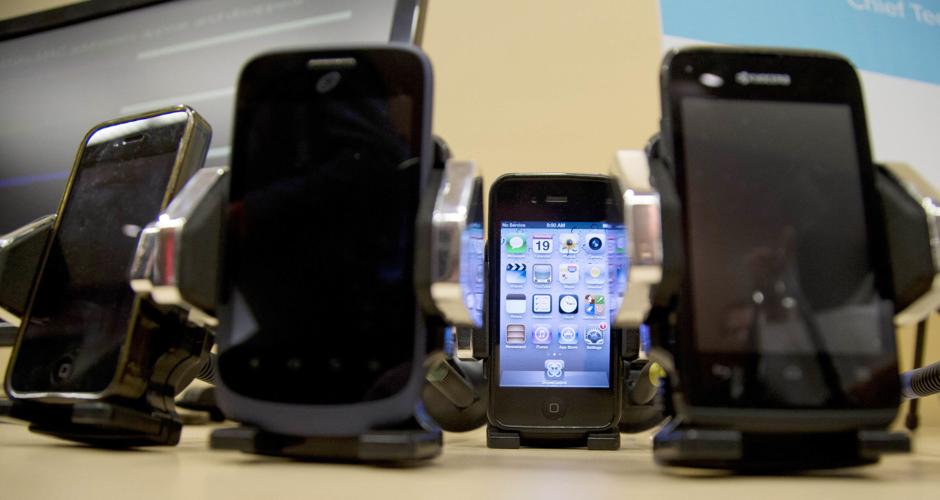
- By Howard Fischer Capitol Media Services
- Requiring police to get warrants when tracking the location of cellphones.
- Expanding the definition of “terrorism” to include acts intended to coerce civilians and “further the goals, desires, aims, public pronouncements, manifestos or political objectives of any terrorist organization.”
- Allowing for an enhanced sentence if the defendant acted because the victim was a peace officer, whether or not that officer was on duty.
- Requiring the Department of Corrections to provide notice to area residents when locating a correctional facility nearby.
- Allowing community notification of registered sex offenders to be done electronically.
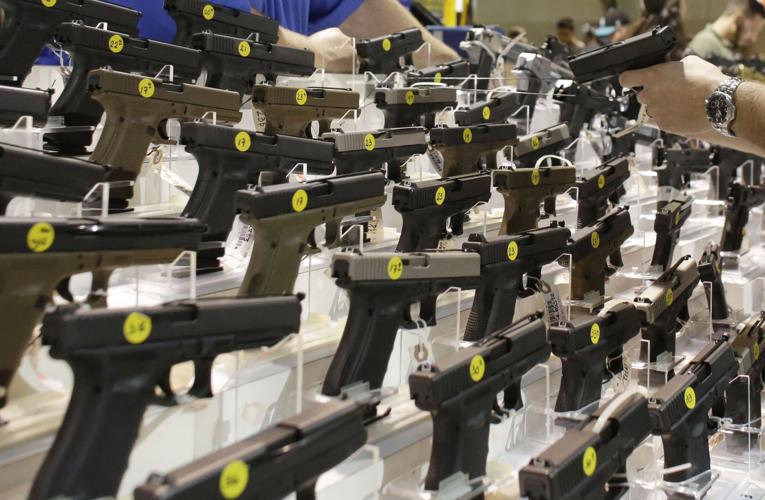
- By Howard Fischer Capitol Media Services
The law with the broadest implications for guns doesn’t even mention firearms. Instead, it bars state and local governments from mandating that anyone who sells any property must get a background check on the buyer.
The effect, though, would be to preclude ĂŰĚŇÓ°ĎńAV or local governments from closing what’s been called the “gun-show loophole” in federal law, which says background checks are not required for sales by individuals, including at gun shows, no matter how many weapons they sell.
Rep. Randall Friese, D-Tucson, derided contentions the measure is not about guns.
“No one is talking about background checks for refrigerator sales or microwave sales or dining room furniture sales,” he said during floor debate. “Let’s just be serious.”

- By Howard Fischer Capitol Media Services
- Prohibiting local governments from telling employees or independent contractors they cannot have a weapon that is on their own property or in their own vehicle.
- Barring any laws saying the only guns that can be sold are those that are “smart” and can fire only if held by an authorized person.
- Carving out an an exception from laws that require $600,000 in reserves for insurers who offer prepaid legal services: It is now $50,000 — but only for those who specialize in lawful use of firearms.
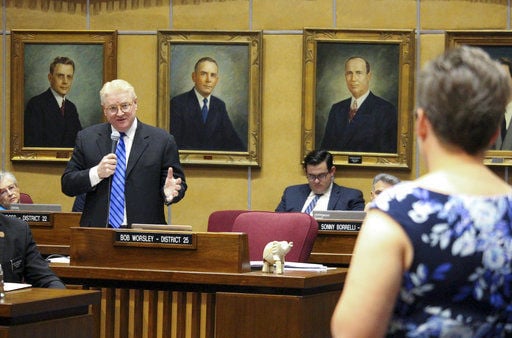
- By Howard Fischer Capitol Media Services
Started in 2011, what are formally known as “education scholarship accounts” were designed for students with special needs. But proponents have incrementally expanded it to where it now also includes foster children, reservation residents and children attending schools rated D and F.
The new law removes all those conditions. But backers had to agree on a cap of enrollment of 30,000 by 2023.
Whether it becomes law, however, is another question. Foes of giving out more vouchers of tax dollars to let children go to private and parochial schools filed petitions Tuesday with more than 111,000 signatures to force the issue to a public vote.
If they have at least 75,321 valid signatures on referendum petitions, the law would remain on “hold” until November 2018, when voters would get the last word on whether to ratify or veto the change.

- By Howard Fischer Capitol Media Services
Other education bills include:
- Easing requirements for people from other states to be able to teach in Arizona and allowing local school districts to decide whom to certify as teachers through a “classroom-based preparation program.”
- Imposing new requirements on school districts to make new high school textbooks available for public review for at least 60 days.
- Allowing children at public schools and children’s camps to use sunscreen with a note or prescription from a doctor.
- Requiring schools to report on suspensions and expulsions involving illegal substances.

- By Howard Fischer Capitol Media Services
Arizona now will have what may be the most comprehensive requirements in the country on what doctors have to do if a baby is born alive during an abortion.
Until now the law has said if there is a live birth, it is the duty of doctors in attendance to see that “all available means and medical skills are used to preserve and maintain the life of such fetus or embryo.”
The new law provides the first-ever definition in ĂŰĚŇÓ°ĎńAV of “delivered alive.” That covers any fetus or embryo, no matter how premature, who shows breathing, a heartbeat, umbilical cord pulsation or “definite movement of voluntary muscles.”
At that point, medical professionals must do everything possible to keep the baby alive. A separate provision says any clinic that does abortions on women beyond the 20th week of pregnancy must have someone available with neonatal skills to care for the child if born alive.
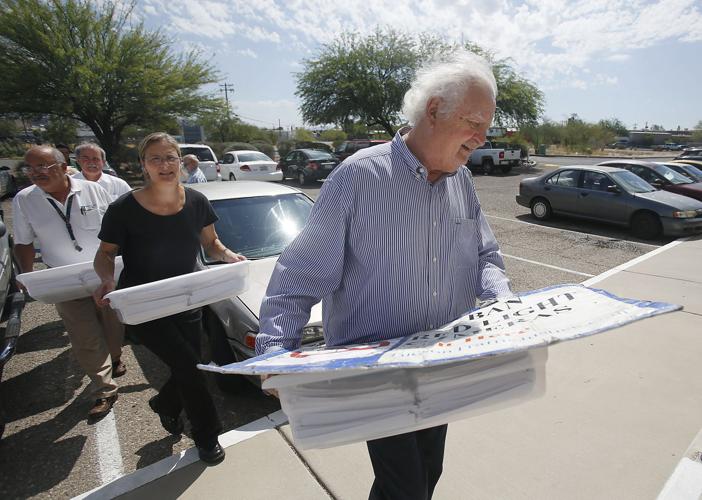
- By Howard Fischer Capitol Media Services
Lawmakers moved on two fronts to impose new hurdles on the ability of individuals to propose and enact their own laws through initiatives.
Until now judges have said that initiatives can be on the ballot if they are in “substantial compliance” with election laws. HB 2244 says there has to be “strict compliance,” disqualifying petition drives for what could be minor violations.
A judge Tuesday afternoon threw out a challenge to the statute.
Another new restriction eliminates the ability of groups hoping to put measures on the ballot to pay circulators based on the number of signatures they gather.
But this measure is subject to a referendum campaign, with opponents hoping to get enough signatures by the end of the day Tuesday to give voters the last word.
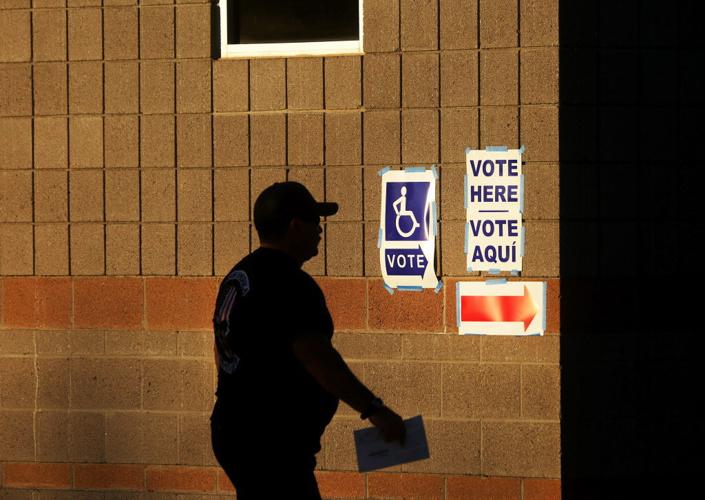
- By Howard Fischer Capitol Media Services
Other ways election laws are being changed:Â
- Stipulating that envelopes used for early ballots have to be designed so no one can see through them.
- Making it illegal to vote in more than one state in elections featuring federal offices that are held on the same day.
- Allowing voters to opt to get the legally required publicity pamphlet about issues on the election ballot by email rather than snail mail.
- Imposing new requirements for meetings and voting by homeowners’ associations.
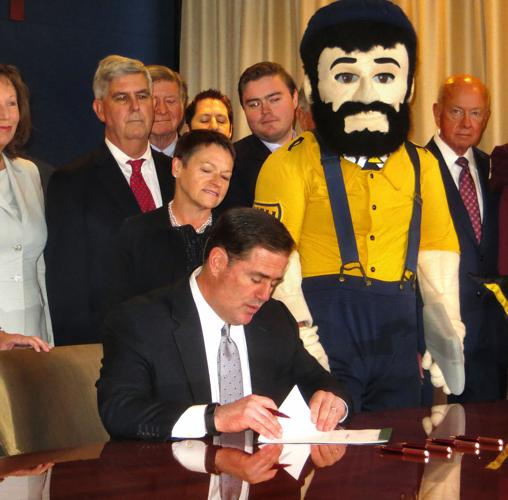
- By Howard Fischer Capitol Media Services
Other ways election laws are being changed:
- Stipulating that envelopes used for early ballots have to be designed so no one can see through them.
- Making it illegal to vote in more than one state in elections featuring federal offices that are held on the same day.
- Allowing voters to opt to get the legally required publicity pamphlet about issues on the election ballot by email rather than snail mail.
- Imposing new requirements for meetings and voting by homeowners’ associations.
Odds and ends
- Exempting those who break into a locked vehicle to rescue a child or pet in imminent danger from civil liability.
- Putting new limits on who can file lawsuits over issues of disability access.
- Barring people from calling themselves “art therapists” unless they are registered with the Art Therapy Credentials Board.
- Repealing limits on how much landlords can pay in “finder fees” to those who locate prospective tenants.
- Enacting new regulations on intrastate movers, including prohibition against refusing to deliver goods, while asking for a higher fee, if the customer pays the price agreed upon before the move.
- Imposing new limits on the ability of counties to regulate home-based businesses regarding things like traffic, parking and delivery.
- Increasing the number of licenses to sell beer and wine.
Play like a pirate or even a mermaid, just not at the same time or place.
As featured on
Arizona adds another defensive lineman to its 2018 recruiting class.Â
More information
- You can now bike or walk up “A” Mountain, but vehicles still banned
- UberEATS, Instacart launch Tucson delivery services
- Amphi HS student arrested in connection with social media threat
- Tucson festival and activities for Aug. 17-25
- Tucson Tech: Sahuarita planning to build its first tech park
- Take a peek at design for Caterpillar's building near downtown Tucson
- Arizona basketball: On Nassir Little's list, Nate Laszewski's offer and that long journey
- Ducey: Major sporting events help lure companies to Arizona
- Tucson weather: Cooler temperatures and a chance of rain
- Here's how TEP restores power after an outage
- Arizona Wildcats QB coach Rod Smith breaks down Brandon Dawkins, Khalil Tate, Donavan Tate
- Watch: You won't believe this summer's bloom on the desert
- Council candidate Felicia Chew starts singing during midtown Tucson forum
- Tucson activities for kids and teens Aug. 17-25
- Majority of Arizona’s Native Americans now speak only English at home
- Suspicious package left behind following robbery at Foothills Mall bank
- Microburst storm hits Tucson's east side, trees collapse at apartments
- Camaraderie trumps competition as Sean Miller, Arizona Wildcats jet off to Spain
- Arizona regents stand firm, won't increase tuition for 'dreamers'
- Steller's Friday Notebook: Uhlich endorses Chew in Ward 3 race for City Council
- Arizona Wildcats RB Nathan Tilford looks the part, should play as freshman
- Man robbed bank, claimed he had explosives, deputies say
- 40 gas station skimmers discovered in Arizona this year
Most Popular
-
Manhattan transplant quickly recognized downtown Tucson's potential
-
Ex-Wildcat Jada Williams: 'Toxic' culture at Arizona took a toll on her mental health
-
 PGA Tour returns to Tucson, shining a spotlight on Starr Pass | Greg Hansen
PGA Tour returns to Tucson, shining a spotlight on Starr Pass | Greg Hansen -
Loss of city in-kind support, higher costs puts pressure on Tucson's Winterhaven Festival
-
Woman killed in Tucson crash with dump truck




